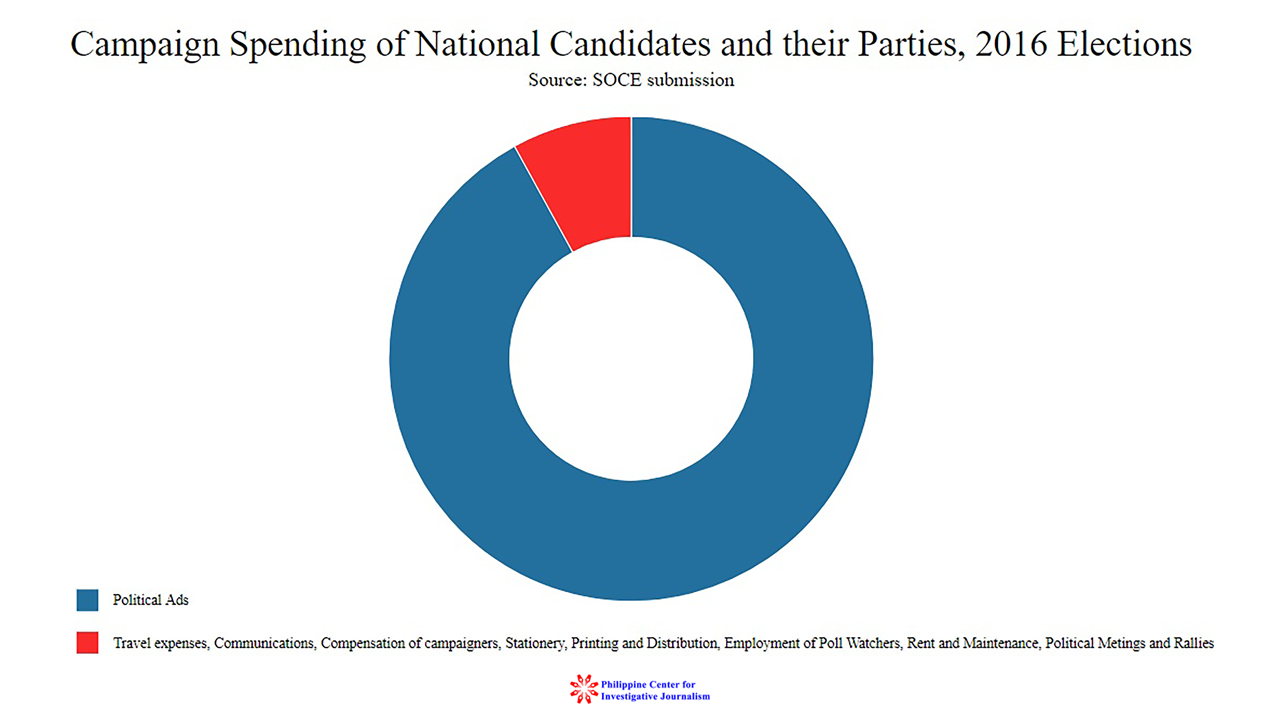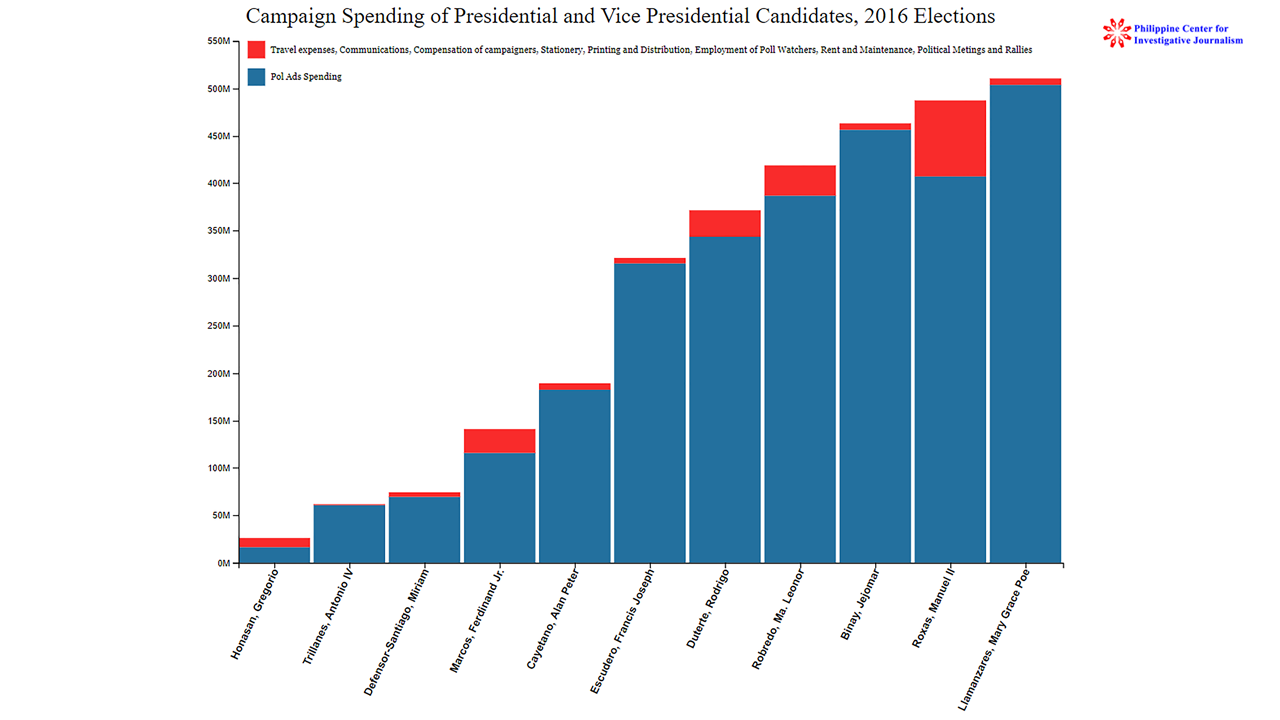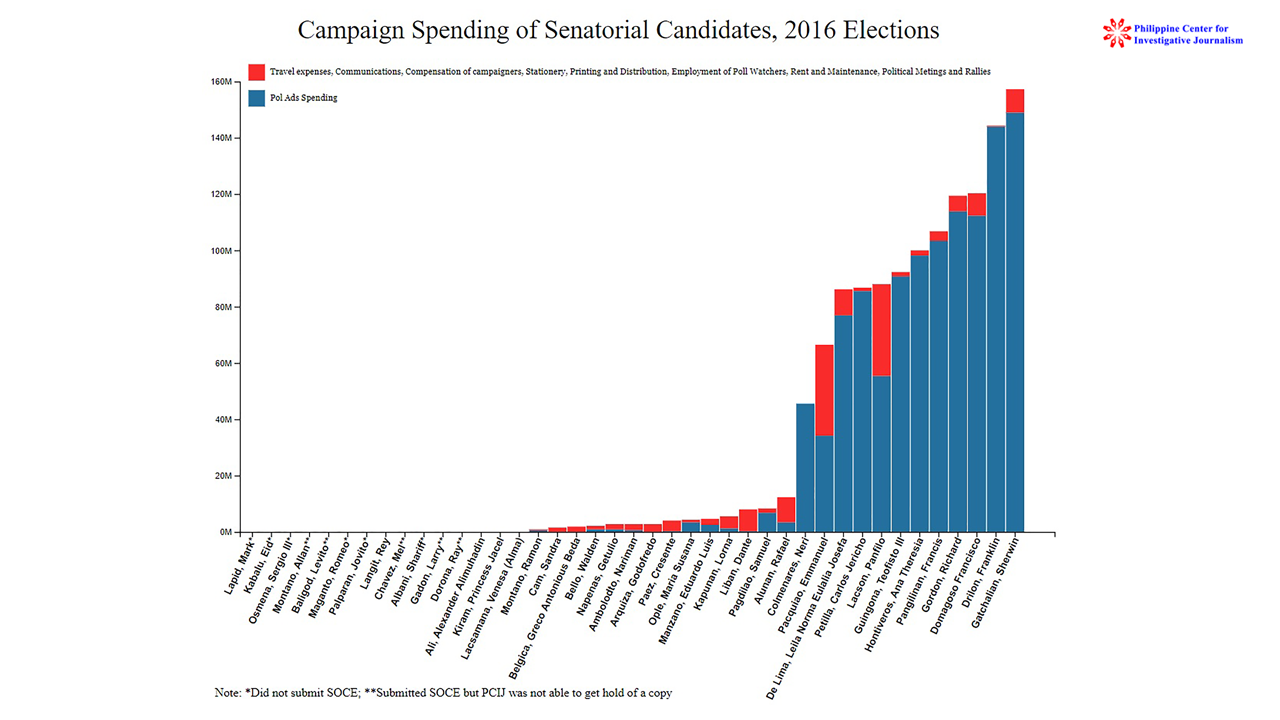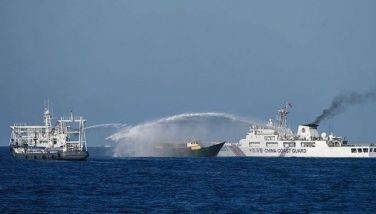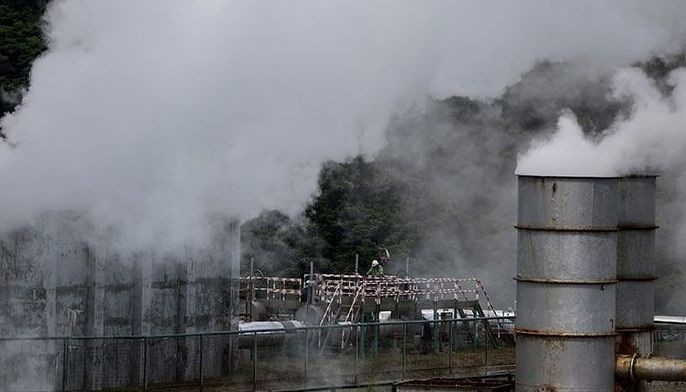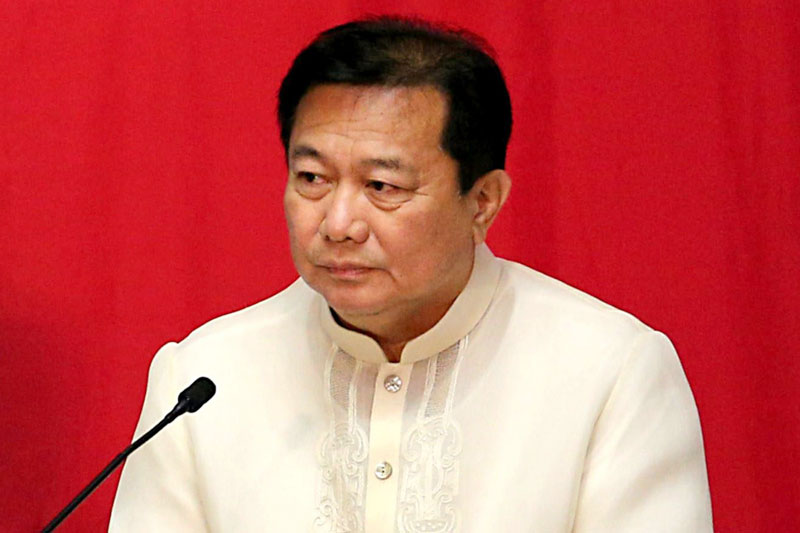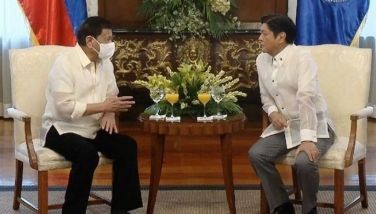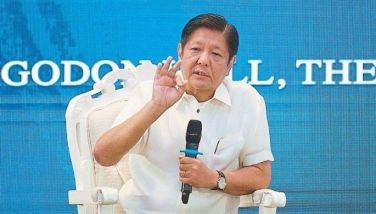Bets for president, VP, senator splurge P5.8B in May 2016 polls
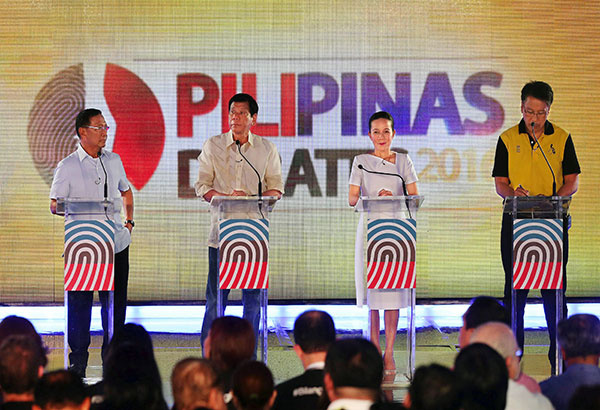
In this March 20, 2016 photo, presidential candidates (from left) Jejomar Binay, Rodrigo Duterte, Grace Poe and Mar Roxas take the stage for the second round of the "PiliPinas Debates 2016" at the Performing Arts Hall of the University of the Philippines campus in Cebu City. Krizjohn Rosales, File
Philippine Center for Investigative Journalism — Elections 2016’s 50 candidates for national office and the political parties that fielded them spent P5.8 billion across the 90-day campaign period, PCIJ has found in its review of documents submitted to the country’s poll body.
But small and big discrepancies clutter the election-spending reports that the five candidates for president, six for vice president, and 39 for senator, as well as their political parties, had submitted to the Commission on Elections (Comelec).
Fortunately, the various documents that Comelec has required the candidates and their political parties to submit in their Statement of Contributions and Expenditures (SOCEs) were precisely designed to allow for comparison and validation.
A consistent string of amounts would result only when the filers (candidates and parties), as well as their contractors (mass media, printers, etc.), had complied fully and faithfully with the poll body's campaign finance rules.
An inconsistent string of amounts should raise red flags of two types: the candidates or parties may have spent beyond lawful limits on campaign spending for the position they have sought, or simply perjured and lied in their SOCEs.
As it is, the amounts that the 2016 national candidates said they spent on political ads, and the amounts that media agencies said they collected from the candidates, are a problematic pair.
P5.4 B in pol ads
PCIJ reviewed the amounts enrolled in the SOCEs that these candidates filed with the Comelec against related documents from the mass-media agencies that hosted their ads and monitoring reports by Nielsen Media of the ads that were actually aired and published, and paid for or by the candidates between Feb. 9 and May 7 last year.
The amounts differed by small and big values. In many cases, the candidates reported in their SOCEs bigger spending on political ads, in contrast to the amounts that media agencies had registered in their receipts and advertising contracts. In fewer cases, some candidates understated in their SOCEs their political ad spending, while media agencies reported bigger amounts.
Still, PCIJ’s review reveals that of the nearly P6 billion spent by the national candidates during the official campaign period, only P400 million or 6.9 percent went to travel expenses, compensation of campaigners, communications, stationery, printing and distribution, employment of poll watchers, rent and maintenance, and political meetings and rallies of the candidates and their parties. The bulk or P5.4 billion went to political-ad placements on various media.
Surprisingly, just four senators out of the 50 national candidates whose SOCEs were reviewed by PCIJ reported having spent for poll watchers. Among the political parties, only the Lakas-Christian Muslim Democrats (Lakas-CMD), the United Nationalist Alliance (UNA), and the Nacionalista Party reported incurring bills for the same expense.
Can't buy love
A lot of money did not buy a lot of love from voters for many big spenders, though. The few exceptions are then Congresswoman and now Vice President Maria Leonor ‘Leni’ Robredo and seven senatorial contenders who got elected.
In their run for the presidency, Sen. Grace Poe, former senator and Local Government Secretary Manuel ‘Mar’ Roxas II, then Vice President Jejomar ‘Jojo’ Binay, and the late Sen. Miriam Defensor-Santiago reported spending P510.8 million, P487.3 million, P463.4 million, and P74.7 million, respectively.
In contrast, the victor, former Davao City Mayor Rodrigo R. Duterte, reported spending only P371.5 million to become the nation's 16th president. Of the five candidates for president, Duterte placed No. 4 in terms of political-ad spending.
As a group, the five candidates for president reported spending a total of P1.91 billion on their campaign. In the May 2010 presidential race, eight candidates ran and spent just P1.58 billion, including their own money, or P330 million less.
In May 2016, of the 55.7 million registered voters, a significant 81.95 percent or 44.55 million actually voted. In May 2010, of the 51.32 million registered voters, a lower 74.34 percent or 38.14 million actually voted.
Big spenders lost
In the senatorial race, losing candidates Francis Tolentino, Francisco ‘Isko Moreno’ Domagoso, Teofisto Guingona III, Carlos Jericho Petilla, and Ferdinand Martin Romualdez placed ranked Nos. 1, 7, 10, 11, and 12, respectively, in terms of the amounts they binged on political ads.
Some of those who lost in the money game actually won Senate seats. Five candidates for senator won even with much less money spent on political ads: Juan Miguel Zubiri, Leila de Lima, Panfilo Lacson, Emmanuel ‘Manny’ Pacquiao, and Vicente ‘Tito’ Sotto III who placed Nos. 13, 14, 15, 18, and 19, respectively, in terms of the amounts they paid for political ads.
(PCIJ was unable to review the submitted SOCEs of five senatorial candidates. Six candidates meanwhile did not submit SOCEs at all. Of those whose SOCEs PCIJ was able to look at, seven did not report spending any amounts on political ads, while one, Rey Langit, said that he did not spend a centavo on his campaign at all.)
Without a doubt, political ads are the shortest route for candidates to make voters recall their names, faces, and taglines. A 15-second or 30-second TV or radio ad does not allow for any discussions of the candidates' platform, however. Even a whole-page ad in a broadsheet should not be text-heavy but, so advertisers say, just offer eye candy.
In the end, volumes of political ads failed to guarantee victory for all the candidates. SOCEs and advertising contracts submitted to Comelec showed that some of the biggest pol-ad spenders also lost big in the elections.
Of the five candidates for president, Grace Poe Llamanzares spent the most on political ads, by her SOCE submission and receipted ad contracts. Hers was P159 million more than what elected President Rodrigo Duterte declared as political-ad expenses. Binay meanwhile overshot Duterte's declared pol-ad spending by P113 million. Mar Roxas, who placed second in the presidential race, spent P63 million more than Duterte, by SOCE submission, and P32 million more by receipted ad contracts.
Vice President Leni Robredo, however, managed to win big after spending big, declaring political-ad expenses that reached P387 million, based on her SOCE declarations. Robredo bested all five other vice presidential contenders in pol-ad spending based on these documents.
Didn't breach caps?
A caveat in this analysis is that while Comelec's campaign-finance rules are designed to allow for sets of documents that could be validated with one another, this is possible only when all the concerned parties follow the rules truthfully.
Campaign-finance rules, after all, employ a self-reporting mechanism for candidates and political parties, and they are unlikely to declare more than what they are allowed by law to spend on their campaigns. In fact, in the May 2016 elections, all the national candidates reported spending much less than the spending limits.
Under current election rules, candidates for president and vice president may spend P10 per voter. With 55.7 million registered voters, including overseas voters, these candidates may incur maximum expenses of P557 million. Candidates for senator with political parties may spend P3 per voter or a total limit of P167 million. Those without political parties may spend P5 per voter or a total limit of P278 million.
By design, the advertising contracts submitted by media outfits should provide additional information to verify and validate the SOCEs of the candidates.
Curiously, most of the candidates reported higher amounts for political-ads spending compared with the consolidated advertising contracts submitted by the media outfits.
Among the few exceptions, however, are senatorial candidates Cresente Paez and Samuel Pagdilao, Sen. Ralph Recto, and Makabayang Koalisyon ng Mamamayan or Makabayan, the party that fielded senatorial bet Neri Colmenares, who in turn reported smaller amounts than what appeared in receipted advertising contracts.
Then there were cases in which PCIJ was unable to verify political-ad spending because the candidate did not submit a SOCE—as in the case of former Pampanga Governor Mark Lapid and veteran senator Sergio Osmeña III.
But if receipted ad contracts are considered, Osmeña would end up as having spent P78 million. Lapid, meanwhile, had all his pol ads worth P3.9 million paid for by Aksyon Demokratiko. (Both Osmeña and Lapid lost in the senatorial race, incidentally.)
The Nationalist People’s Coalition, for its part, seemed to be in another category altogether, declaring zero amounts in its party SOCE, yet providing a breakdown of expenditures in its Summary Report of Lawful Expenditures or SLE.
Party benefits
By Comelec's campaign-finance rules, political parties may also spend for candidates they fielded, with a maximum of P5 per voter. For the 2016 elections, the spending cap for political parties was set at around P279 million each.
Among the political parties, the Liberal Party showed greatest disparity between its declared pol-ad spending and receipted ad contracts. It declared pol ads worth P210 million even as its receipted ad contracts amounted to only P90 million. This benefitted Roxas and tandem ads for Roxas and Robredo.
As for PDP-Laban, Duterte’s adoptive party, it declared P129 million worth of political ads even though its receipted ad contracts amounted to only P62 million—all benefitting Duterte.
Some candidates reported little pol-ad spending, though, by maximizing their being the head or leader of their respective political parties. This was the case at least for the late Senator Santiago with the People’s Reform Party and Ferdinand Martin Romualdez with Lakas-CMD.
Admittedly, however, confusion can arise over who should declare the expenditure for the political ads: the candidate or the party? In the case of Santiago, the party and the candidate declared the same amount in their separate SOCEs: P70 million. Receipted ad contracts, however, state only P36 million for PRP and P2 million for Santiago.
But Gordon’s case takes the cake in terms of strangeness. All the receipted ad contracts were paid for by Bagumbayan Volunteers and not a single contract reflected Gordon as payor of the ad. In his SOCE, however, Gordon declared P114 million worth of pol-ad spending.
Comelec records show Gordon as having run as an independent candidate. As for Bagumbayan Volunteers, the Comelec's CFO says that while it is an accredited political party, it did not field a candidate in the 2016 elections.
Can't donate but did
In the meantime, several business entities seem oblivious to the ban on companies donating to election campaigns. While moves are under way in Congress to amend the Omnibus Election Code, particularly to allow such donations, the prohibition remains in effect.
Section 36 of Batas Pambansa 68 or the Corporation Code of the Philippines prohibits corporations, domestic or foreign, from giving donations in aid of any political party or candidate for purposes of partisan political activity. It penalizes violators a fine of P1,000 to P30,000 or imprisonment of 30 days to five years or both plus dissolution proceedings before the Securities and Exchange Commission (SEC).
As well, Section 95 of the Omnibus Election Code prohibits certain types of corporations from donating to any political party or candidate such as financial institutions and corporations with government contracts, among others. Its violation constitutes an election offense and violators may face jail terms of one to six years, without probation. Violation of this rule is also a ground for disqualification of the recipient of the donation.
Despite this, Bansa Tri-Media Corporation, an SEC-registered company but whose Facebook page has only three likers/followers and no zero posts, donated some P3.2 million worth of pol ads to Duterte, based on a receipted ad contract submitted by GMA Network, Inc. The file, however, did not include a certificate of acceptance of the donation by Duterte; Duterte himself did not list Bansa Tri-Media Corporation as one of his donors.
Patriot Freedom Air, Inc. also paid for P24.3 million worth of pol ads for senatorial bet Francis Tolentino. In his SOCE, Tolentino listed three persons donating to his campaign coffers through Patriot Freedom Air, Inc. The total amount of their donations, based on Tolentino’s SOCE, amounted to only P22.4 million. Patriot Freedom Air, Inc. does not appear in the registered companies under SEC.
No more 'Friends'
In its series of orientation forums for various stakeholders, including the candidates and their parties, the Comelec CFO staff reiterated that Section 98 of the Omnibus Election Code requires the true names of campaign contributors.
The Code states: “No person shall make any contribution in any name except his own nor shall any candidate or treasurer of a political party receive a contribution or enter or record the same in any name other than that of the person by whom it was actually made.”
“Friends,” therefore, are no longer legitimate donors.
But “Friends of Risa Hontiveros” donated P236,000 worth of pol ads to Hontiveros, who did not acknowledge any “Friends” in her SOCE.
“Friends of VP Binay”—also known as AgriPartylist, Bataan ads, Bicol ads, FILCABS, and Sorsogon ads—was written in advertising receipts as payors of P250,000 worth of pol ads of Jojo Binay. But Binay did not acknowledge these “Friends” as contributors in his SOCE.
The other pol ads donors who were not declared, or whose donations were under-declared, in the Summary of Contributions Received (SCR) submitted by their candidates are:
Donor |
Candidate |
Ad Contracts (PhP) |
SOCE declaration |
|
Luisa Pigao |
Jejomar Binay |
73,159 |
Not declared in SOCE |
|
MRRD-NECC (Mayor Rodrigo Roa Duterte – National Executive Coordinating Committee) |
Rodrigo Duterte |
284,323 |
Not declared in SOCE |
|
RoladoAverilla |
Antonio Trillanes IV |
42,470 |
Not declared in SOCE |
|
Eduardo F. Chan, Jr. |
Risa Hontiveros |
19,875,041 |
500,000 (Eduardo Fugoso Chan Jr.) |
|
Gwen Diaz |
Cresente Paez |
179,504 |
Not declared in SOCE |
|
Jonathan Serrano |
Roman Romulo |
1,217,554 |
Not declared in SOCE |
— With research and reporting by Malou Mangahas, and additional research by Fern Felix, Davinci Maru, Vino Lucero, Ana Ysabel Manalang, Jil Danielle Caro, and Steffi Mari Sanchez, PCIJ, August 2017
- Latest
- Trending






